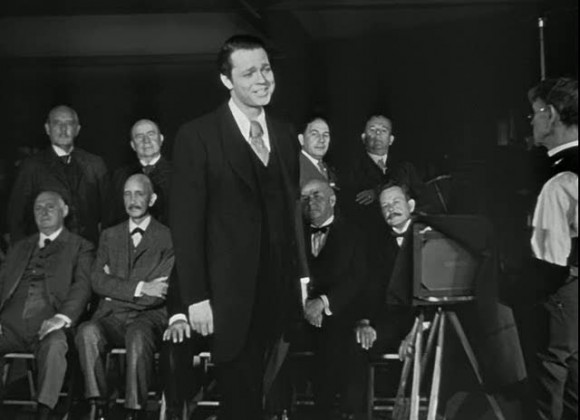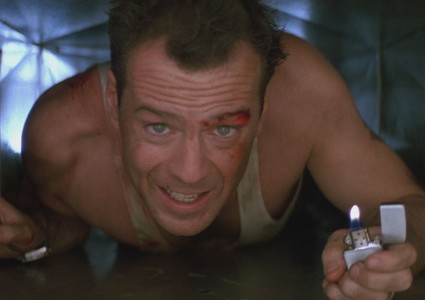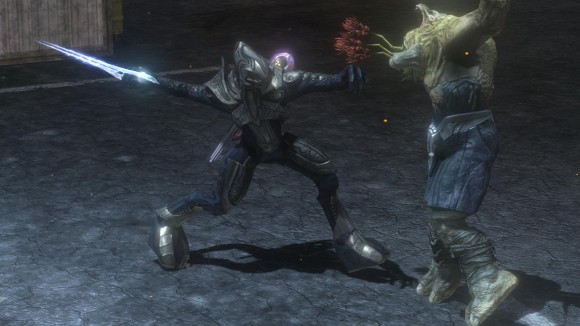
When it comes to the question of taking video games seriously, many people have become a little caught up in looking for the Citizen Kane of the medium or, at least, looking for a game that possesses greater depth than a half-submerged rubber ring in the Dead Sea.
At the moment this seems to be too lofty a goal, and instead we should be seeking something that is easier to accomplish right now within mainstream video games.
Citizen Kane is about a subtle and all-encompassing self destruction of the main character, an ambitious person absorbing himself and destroying everyone around him. No matter how charismatic he may be he is doomed. This is presented through the eyes of those around him and at no point is he the narrator. This leaves the story ambiguous and open to interpretation. Although the film strongly leans toward one conclusion it is still down to us, the audience, to decide what we believe. Already, some who have watched the film will be calling me on my opening three sentences and saying “That’s not what is about at all!â€
For games to attempt something similar to this would involve invoking something that games are not about. Within the industry as it exists today it seems unlikely that something similarly open to interpretation could function, because the audience is so actively involved in the experience. That’s not even to mention how much of the gaming audience is resistant to the idea of anything being ‘non-canon’. Fuck, people struggle to appreciate how Ico could be about a massive bully. How are games supposed to articulate, in any kind of constructive manner, the idea that a protagonist is not the winner, that he might be a shitty person, without instantly turning off the majority of their audience?
Gaming is too involved, too personal and – let’s be honest – almost every verb used in almost every game is about destroying or killing something. Literally.
So, what I am trying to get at is that I don’t want to see a Citizen Kane of games. The atmosphere and environment of that film is not right for this kind of medium. What would be right for it, and is also something that every attempt at has failed, is a Die Hard game.

Certainly game versions of the franchise have been produced as early as the NES, but no developer has been able to accomplish what Die Hard does so well. Bruce Willis is iconic as the main character John McClane, a character who dragged action films away from Hollywood super-men (ubermensch if you will). He wasn’t some steroid-pumped fuck with perfect hair and perfect aim; instead he had no shoes and a prominent, receding hairline. His quips were something that everyone could identify with because they were down to earth. John didn’t want to be Clint Eastwood; he wanted to be Roy Rodgers. This self-deprecating nature endeared him to us and at the same time made us care.
Some may argue that recent efforts like Uncharted have approached this idea of a Die Hard-style character. I would agree that Nathan Drake is more appealing than most stars in games, but the reason that Uncharted slips more into the Indiana Jones field is not just because of the archaeology angle but because Uncharted doesn’t have the right villains and Nathan Drake is just too clean.
Die Hard has these human, evil but oh-so easy-to-like bad guys. From the onset of their storming the Nakatomi building you are given insight into the people they were before they embarked on this endeavour. The bigger parts played by Alan Rickman and Alexander Gudunov are easily identifiable and even have lines to rival Bruce Willis. However the illumination is in the details of the bit characters: the scummy cokehead co-worker, the pregnant secretary, the Johnson agents. One of my favourite moments happens when the police are about to storm the Nakatomi building and in response the bad dudes group up in the main foyer. While waiting for the SWAT team assault one of the villains waits behind a counter, only to hesitate, look around, then scurry under the counter to eat a chocolate bar in preparation. The scene is totally throwaway but it is hard not to like because it breaks that personal barrier. You might not like this guy but you can certainly identify with the urge to eat free sweets.
Outside a small handful of games – Bioshock’s Big Daddy and Little Sister relationship being the first to spring to mind – games cannot capture that same humanity within the ‘bad people’ players are pitted against.
Die Hard is also able to play with you because, deep down, there is a part of you that kind of wants the terrorists to get away with it, with the result that the scene where Rickman is thrown off the building becomes twice as effective. Despite his setup as the antagonist, and you do want him to fail, you still are gutted that such an intriguing character is gone.
This is why I was so deeply disappointed with Halo 2‘s unravelling. At certain points the game puts you in the shoes of an Arbiter, a mortal enemy of the protagonist Master Chief, giving shape to the alien’s reasons for wanting to kill the original protagonist. This, and some solid voice acting from Keith David, makes it easy for you to identify with with the character. As the game flits between the two perspectives it is the Arbiter who you end up liking more as his plight represents a more personally compelling story. The game cleverly starts making the two stories wind ever closer together and it feels like the game is going to end in a painful moment where you, as Master Chief, will have to kill the Arbiter. Of course Bungie pussied out and made them best buddies.

Few games manage to to come close to that Die Hard feel because we are so overly obsessed with ‘winning’ that it becomes difficult to understand someone else’s perspective. Far Cry 2 had a stab at it with the buddy system but the resolution of that did not feel right – in fact it seemed carted out at the last minute as a rushed chapter close.
There are a few other games that have hinted at such an approach: No One Lives Forever and Sword of the Berserk: Gut’s Rage. Neither are quite right in terms of what it is they are trying to convey, the former because it is inevitable that you will kill because the mechanics dictate as much and the latter because it is what the narrative dictates. This inevitability is forced in such a way that the most important advantage games have over other mediums – player agency – is removed and this dulls their impact.
So my question is, have we come close to a Die Hard of video games? Is there any hope of using these verbs we are so accustomed to in such a way that designers can still make us like the things we must kill? Where could we be looking?
Comments
18 responses to “QOTW: Yippee Kay Ay”
It is a tough one, because of the way in which characters can end up rubbing people the wrong way if they don't fit the mood.
I have definitely had a few games affect me quite deeply but I want that level of depth to otherwise throwaway characters that it is very hard to do. Especially as there is the danger that a player will 'throwaway' the character before the developer has had the chance to show them that side of the NPC. Or worse the, like a TV show or kids' cartoon the developers get too attached to their 'villain' and can't do the right thing.
Way of the Samurai, Fallout 1 and 2, I can count the games that attempt this sort of thing on one hand.
It's probably a bit of a predictable thing to say, but in terms of great incidental characters: Planescape Torment.
I've only played Way of the Samurai 3 but that's a good example as well – because a major character may become incidental due to your approach, or an ally may become an antagonist – although generally the game has a cast of about a dozen significant characters, a dozen companions and then a huge bundle of nobodies.
Huge bundle of nobodies? Mate, you have not played that game enough. That are almost no 'nobodies' in that game if you play it in certain ways. Each character has their own little story and depending on how you play it you will see different aspects to it (man only becoming a Fujimori guard to feed his family, mysterious old lady that I can't say too much about, the 'Samurai killer' etc)
Gah, I am going to start ranting on WotS again.
You're probably right that I haven't played the game enough. I just recall a lot of characters cropping up on numerous playthroughs who didn't really matter. E.g. the couple / guy / whoever with the food shipment that was ambushed by the rebel clan (when you first meet the young, idealistic chap) and the soldiers bullying him. Or the shopkeepers in the small town. Or the guys picking over corpses at the battlefield (I think there are two minor characters doing the same who don't do much but are interesting (the giant, a young woman and – hmm – I did once encounter a random nameless samurai there who I was confused by and ended up fighting – and twice as many background people).
In retrospect there are lots of other characters who don't play major roles but are somewhat fleshed out.
You can sort of develop into a relationship with the girl searching the bodies and she will follow you around. And the nameless Samurai, there is a whole story right there…
Anyone ever play Arc: Twilight of the Spirits? It's an awesome PS2 JRPG, one of the few from the Arc the Lad series to make it all the way to the Englands. In that you alternate between playing the character who would normally be the antagonist and the character who would normally be the protagonist, basically doing each chapter twice – once from each perspective.
At first I had sympathy heavily balanced towards the 'good' one, but ended up really invested in both, they had different abilities, different party members and different sides of the same pretty decent storyline, but mostly they were just memorable characters.
Very smart and engaging combat system too.
Ugh, just googled it and first result is from Gamespot's review: "a solid RPG that doesn't take many chances". Suppress rage; suppress rage; reeeellllax. OK.
I didn't know Gamespot was an RPG!
With regards to Far Cry 2 I feel they also had a stab at the likable bad guy in the Jackal, having him supporting fairly lofty goals and underlying ideals. But really everything peters out when you end up working hand in hand without the option to simply finish your actual mission, the one you pursued for 90% of the game.
It may not have been a very popular choice but it would have been able to provide a difficult conflicted choice which would have been nice to see for a change. To have achieved a resolution that perhaps in the end made you the player more of the bad guy than the bad guy, would be uncomfortably rewarding.
Hmmm that was why I didn't include it as an example because:
a) It is a bit of a spoiler
And:
b) It is exactly the problem I had with Halo 2 in regards to the Arbiter
AND:
c) I talk about Far Cry 2 too much as it is
I tried my best to keep it as spoiler free as possible, but it was difficult.
Also,
I'm finding I have problem C as well…
FFFFFFFFFFFF-
*ahem*
Well then… so much for ''branching off'' later on (still early in my second playthrough-which-I-have-yet-to-complete-beyond-65%-again).
I guess that's what I hope I would get to do anyway. Ever since the handful of tapes I found about the guy I couldn't help but think he wasn't that much of a bastard after all. He just happens to have the clearer and broader vision of all the characters/nations in that game. He's not inhumane – he just knows nothing humane can be done anyway.
At least that's what I got to figure out up to 64% progression….
Jeez, quit breakin' your save files…
I hate intensedebate, it won't let me log in via it.
Anyhow:
I've often thought the grunts in Halo were hugely likeable. Little ineffectual cowards who would sit and chat amongst themselves, before leaping into action upon spotting you (either firing or running away) with a cry of "He's here!"
I think the running away and the way they are so affected by your presence is what endears them to me – the way they talk gives a distinct impression that they've been told to stay and wait here for you by their bigger, more physically dominant brethren, whether they necessarily want to or not. They are what Gretchin are to the Orks, for any Warhammer 40K players.
Oh oh oh, General Sarano from Bulletstorm. The entire game revolves around killing him, but <spoilers> when you're forced to side with him,</spoilers> he's so nastily hilarious you can't help but like him.
Bulletstorm: Citizen Kane of video games.
Funnily enough a number of the points I mentioned above crop up in this interview with Erik Wolpaw and Chet Faliszec on EG: http://www.eurogamer.net/articles/2011-03-10-port…
The way they discuss the nature of the Chell/GLaDos vs. Player/GLaDOS relationships ties in. And of course the interview is very funny, because it's Erik and Chet.
AJ, all in all, you could have summed up this article by asking (rhetorically mind you): “Can a game successfully convey what Gary Oldman can as a villain?” ïŠ
In all honesty, since the medium itself is evolving more and more into interactive cinema, I would hope to see more intricacy applied to both the protagonist and antagonist roles. There are several games which miraculously were capable of connecting conflicting emotions to specific characters well, but unfortunately they aren’t very many.
Prime Example:
MadWorld
Protagonist -> Jack Cayman – Yes, he is cliché and yes, this is one of Platinum Games’ specialties (couldn't of spoofed Running Man better myself)
He was ugly, overpowered, naïve, presumptuous, and tremendously dry. He is a typical anti-hero familiar action flicks scattered within our time. With all these faults of his, Jack still manages to capture his role and connect with the user with stellar script that accompanies every situation he is in.
Antagonist -> The Black Baron – Again, delightfully cliché. A perfect amalgamation of scum, filled with witty dark commentary. He is the host of Deathwatch, with his female S&M enthusiast assistant, Mathilda. Each skit ends with the Baron condescending Matilda, and her brutal physical response, all executed in a goofy, surreal manner. Everything done has its merit within the storyline, and leaves the viewer/user in a torn state. This tenacious team are a great example of characters in which are placed in a standard role as villains, that can be loved and hated thanks to their clever integration. Human-Fucking-Darts people!!!!
Other examples with characters that have similar traits and relationships (asymmetrical love and hate):
Viewtfiul Joe 1 & 2: P – Viewtiful Joe; A – Captain Blue
No More Heroes 1 & 2: P – Travis Touchdown, A – Sylvia Christel and 90% of the Assassin list.
Fallout New Vegas: P – Brotherhood of Steel, CACHINO, A – Caesar, White Glove Society
Vanquish: P – Sam Gideon
InFamous: P – Cole McGrath, Zeke (ally)
The Darkness: P – Jackie Estacado & The Darkness
Darksiders: P (ally) – Samael, The Watcher
Final Fantasy 6: P – Terra; A – Kefka
Resident Evil Code Veronica: A – Albert Wesker
Ratchet & Clank (first few games) – A: Captain Quark
Mass Effect 2: P (ally) – Mordin Solus
Metroid Other M: P – Samus (a very dry, introverted and emotional version of the classic character that’s hard to like because of so, but is contrarily because of how she manages to overcome such a struggle and adhere to logic during such a young age).
Dragon Quest VIII: P (ally) – Yangus
Bulletstorm: P – Grayson Hunt, Ishi (ally) – Sorry guys but Sarano’s character was a complete travesty. The quality of his voiceover diminished as his presence increased. I couldn’t like the guy; his delivery was putrid.
And may I add that Bulletstorm is not a game, it’s a fucking COD template.
I would also like to add a disclaimer, I did not login to alternative login to create this post.
Interesting choices, some of them I would completely disagree with and others I would argue aren't allowed.
The ones I don't agree with are Vanquish, Metroid another M, InFamous, and Resident Evil. Neither of those games had anyone interesting.
And you can't count The Darkness as it is based on a comic book.
But yeah, some one capture Zorg from Fifth Element and that would make me happy.
*sighs* Indeed you are correct, The Darkness is a comic. It completely slipped my mind.
Jean-Baptiste….. Emanuel….. Zorg!
[…] back as 2011 AJ has been saying that we don’t need a Citizen Kane of videogames, we need a Die Hard of videogames. He finally got his wish! […]